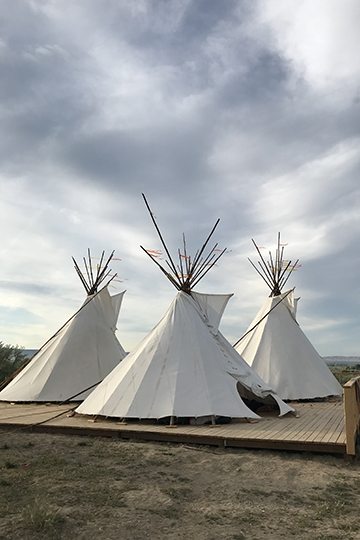
My trip to White Swan, Washington was both foreign and domestic. Though the location lies within the continental United States, the reservation land belongs to the Yakama Nation. I learned history there that I had not known — or, more embarrassingly, had never even been exposed to. My eyes were opened to the wounds of governmental and bureaucratic strokes, which have come from a history of legislative lashes and red-tape chokeholds. I saw in small doses that the wounds reside in the people, the land, the society and the infrastructure. They are generational and regular, taking the form of alcoholism, drugs, depression and abuse (of many kinds). When someone dies in the Yakama culture, tradition calls for one year of mourning until the first anniversary of the death. People both young and old die so often that families are always in this state. The community perpetually mourns.
Sacred Road Ministries has brought hope in the midst of despair. The ministry operates through Hope Fellowship in White Swan. They have worked tirelessly to grow the kingdom of God in a place where, only sixteen years ago, kids had never heard the name of Jesus. The ministry began as a family unit but now welcomes approximately sixty volunteers biweekly to love and serve the community throughout the summer.
I was able to participate in this effort and step into the whirlwind of activity known as Sacred Road. It seemed at times that I was a small piece in a well-oiled machine, but I realize now that the gears of this “machine” were the busy hands and feet of Jesus. Sacred Road vividly demonstrates the truth that the body of Christ is one body with many parts (1 Cor. 12), with each part having a crucial role through which God works. The arms build homes, repair fences and landscape property. The legs teach kids about the Bible and show them that there is a God who loves them. The hands cook metric tons of food. The feet transport hundreds of children and youth to church services and events.
Our team spent half the day on worksites, constructing or repairing projects based on community and church needs. Sacred Road encourages a rotation of prayer among the workers throughout the day. Prayer covers the community effort and the people therein. The other half of the day took place at Kids Club — a time of playing and learning in two local housing projects. Laughing and yelling rise from playground games and piggyback rides. Crafts give the young creators an outlet of inspiration. The time concludes with a welcome snack, a Bible lesson, and a song about our God who is “so big, so strong, and so mighty / there’s nothing my God cannot do.”
I encountered a small boy at Kids Club who seemed to be mentally and linguistically disabled. His eyes lit up, but he could only ever say, “Wow,” or, “Look at that!” He could not tell me his own name. Then the weight of this truth struck me: The Lord hears him and knows him. God does not even need these two little phrases to hear his children.
Sacred Road showed me Christ in a way I did not expect. It gave me the opportunity to “see him in the poor, the hungry, the hurt, the wordless creatures, the groaning and travailing beautiful world.” These words from Wendell Berry’s novel Jayber Crow articulate thoughts that I gradually strung together in White Swan. There are forgotten, neglected people all across our world. Christ beckons us to them, both across the hall and across the country. He bids us to “come and see” what he will do.
